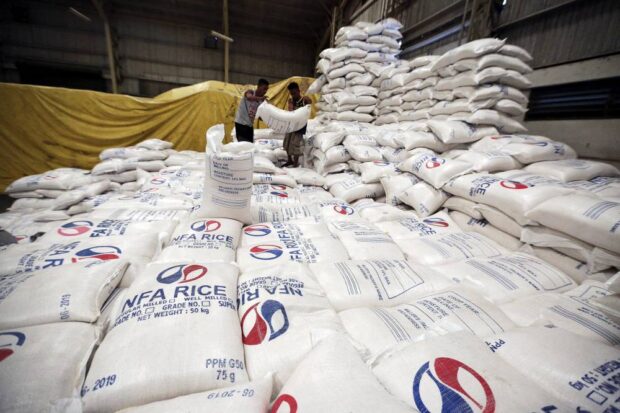Ex-DAR chief wants NFA to return to ‘buy high, sell low’ rice system

INQUIRER PHOTO/GRIG C. MONTEGRANDE
MANILA, Philippines — The National Food Authority (NFA) should return to its old policy of buying palay from farmers at a high price, then selling rice to consumers at a low price, according to a former Department of Agrarian Reform (DAR) official.
At the hearing of the House of Representatives’ committee on agriculture and food on Monday, ex-lawmaker and former Agrarian Reform secretary Rafael Mariano said NFA should do this as it is not a profit-generating body — noting that the “buy high, sell low” system would give subsidies to both farmers and consumers.
“Before, when there was no RTL (Rice Tariffication Law) […] the formula being used was to buy high, sell low. This means the palay of rice farmers will be bought at a high price, and will be ground by NFA and sold at a more affordable price to consumers,” Mariano said in Filipino, when asked by Bulacan Rep. Tina Pancho about his suggestions.
READ: Marcos to certify rice tariff law amendments as urgent
“So this means there is a subsidy for our farmers who plant rice, and a subsidy for our buyers, the Filipino people,” he added.
Pancho then asked Mariano why it seems the NFA has been neglecting the farmers. “What’s confusing now is why the NFA, an agency of the government, seems to neglect you farmers who are now obliged to sell your products to traders, at a low price. Isn’t it that NFA should be helping you?” Pancho asked.
READ: Farmers’ group decries rice tariffication law, claims P44B lost
Do front-loading
“That’s how it should be — what should actually happen is even if the palay procurement fund of NFA is low, we should do front-loading. This means, for example, if our main crops would be harvested by October, the NFA funds should have been downloaded already by September 1, prepositioned in strategic NFA warehouses or wherever the NFA’s buying stations are. It should be that way, your Honor,” Mariano replied.
Pancho then asked Agriculture Secretary Francisco Tiu Laurel Jr. as to why this system is not being used.
According to Laurel, they have been preparing and shaping NFA to act like a trader so that it could compete during the next harvest season.
“With the NFA Ma’am, Cong. (Pancho), Mr. Chair, NFA is different now, the council approved the NFA’s buying range — from let’s say P23 to P30, and this depends on the area. Basically the mandate, our direction in the NFA now, is we will now fight and act like a trader,” Laurel explained.
“Before, the NFA will have meetings, and then the NFA price will be set at P23 (per kilogram of palay). After the meeting, the trader would just increase the price to P23.50 (per kilogram), then we cannot buy anything. Now, that won’t happen, we have bought lots of palay, but this is unfortunately the last harvest season,” he added.
Laurel said for the next season, they intend to “buy high, sell low” so that farmers would be encouraged to plant again. He also said that the Department of Agriculture is building dryers and rice silos so that the NFA can store more rice.
Encourage farmers
“We are now ready for the next harvest season, we would fight it out now, and definitely I want to pay higher prices to the farmers, the important thing is for them to earn so that they would plant again, plant more, to encourage them and for them to feel that their increased performance was incentivized,” he said.
“The problem is we really need investment in agriculture because during this wet season, our palay buying would be limited because we do not have dryer systems, we do not have a rice silo, but when we finish our P10 billion-worth (facility) this year, and the other few billion (projects) last year that will be worked on this year, we can buy more from farmers because we can have them dried,” he added.
Talks to amend Republic Act No. 11203 or the RTL have been abundant, with the House leadership believing that changing the law would make rice prices go down. Speaker Ferdinand Martin Romualdez and Deputy Majority Leader Erwin Tulfo said the RTL would be amended to allow NFA to sell cheaper rice directly to consumers.
The committee is currently discussing proposed amendments to the RTL, but not all within Congress are in favor of such moves. Makabayan bloc lawmakers, particularly Gabriela party-list Rep. Arlene Brosas, believe that the RTL must be repealed, because it negatively impacted farmers.
In a statement earlier, Brosas acknowledged the administration for giving Congress the chance to discuss the effects of RTL — which they believed disadvantaged local farmers because consumers prefer the cheaper but imported rice grains, compared to the local variety which is priced higher.
Progressive groups believe that even if the tariff for imported rice were used to help farmers, the local industry was severely affected as rice farming was no longer seen as profitable.














